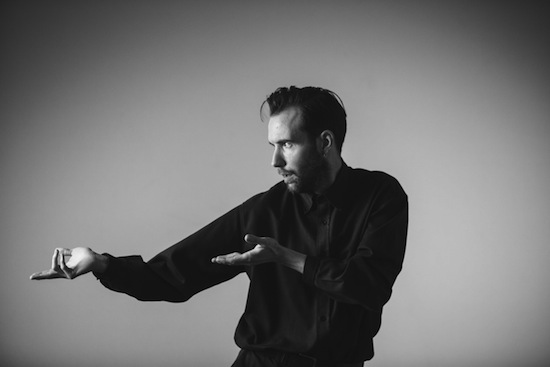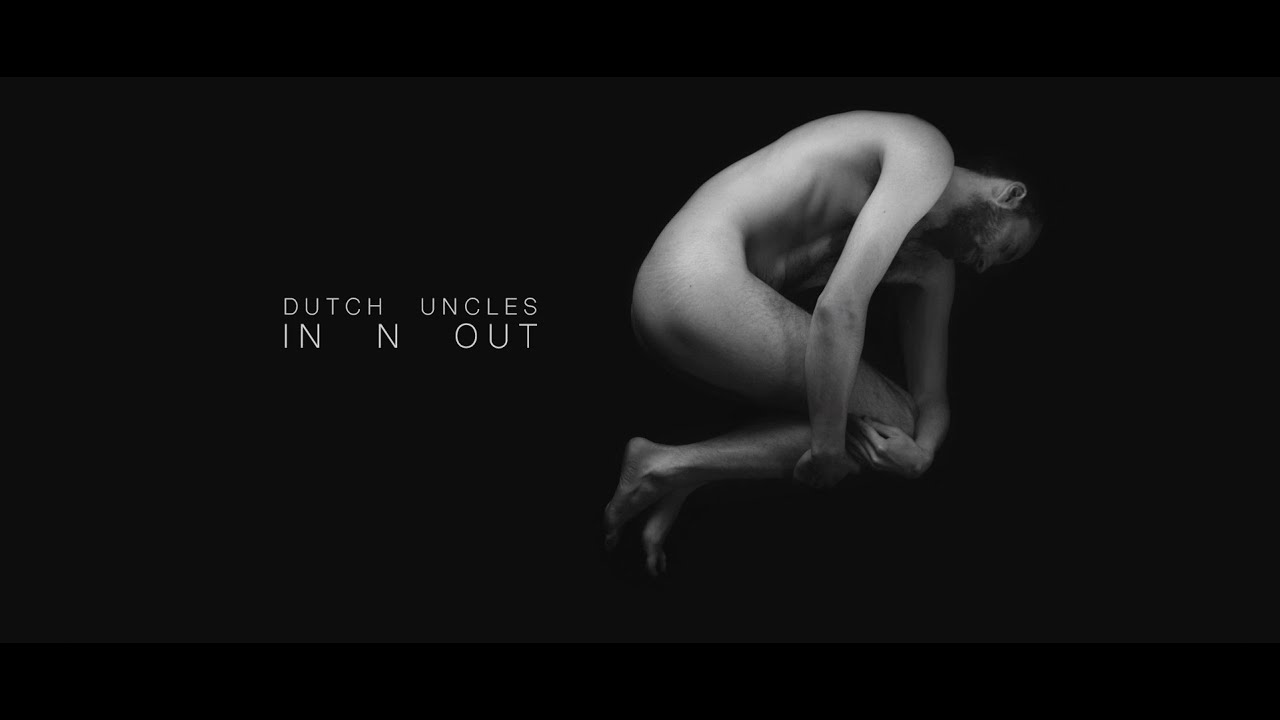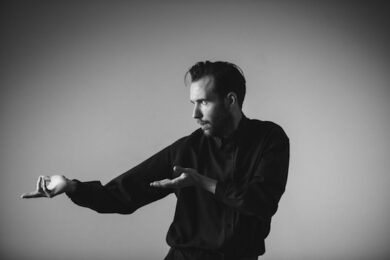"I only do it for a worthy cause / Virginity or menopause / You’ll have an instant heart attack if I jack you off."
‘Jack U Off’ by Prince, 1981
"I want in and an out like / It’s been around since you’ve known me / I want in and out like / Better you didn’t know me."
‘In N Out’ by Dutch Uncles, 2014
It’s an icy Sunday evening and in the cosy back room of a south Manchester pub Dutch Uncles’ singer Duncan Wallis is sifting through A4 printouts of some of Prince’s raciest of lyrics. From the reaction of the unsuspecting couple sat next on the next table, it’s fair to say that 30 years on the words to ‘Head’ and ‘Sister’ (from 1980’s Dirty Mind), or ‘Do Me Baby’ and ‘Jack U Off’ (from 1981’s Controversy) still have the capacity to shock and awe.
I’ve brought the lyric sheets to the interview for two reasons. Firstly, Duncan and I both love early-period Prince (he favours 1979’s eponymous album, while I’ll arm wrestle anyone who doesn’t defer to Dirty Mind) and we’ll both happily exploit any excuse to reminisce about Mr Rogers Nelson’s purple period.
The second reason was that Dutch Uncles are about to release their new album – the slick pop of the career-high O Shudder – and the subject of sex features on a number of tracks. Duncan is the band’s principal lyricist and I’d wanted to explore how he had approached writing about sex (and why that differed to the slavering porno-patter of our beloved Prince) in a way that, even under the closest scrutiny, could not be misconstrued or misinterpreted. Indeed, as if to make that very point, the video to lead single ‘In N Out’ features a very naked – and fairly hairy – Wallis, seemingly in an attempt to redress the male/female ‘flesh-on-display-in-pop-videos’ imbalance.
Sex talk aside, O Shudder could well be Dutch Uncles’ finest album to date. More immediate than its predecessor (2013’s Out Of Touch In The Wild), it’s a record that simpers with an understated confidence as the Manchester-based quintet explore their take on twinkling pop funk and an inner desire to sound like, as Wallis revealed, "Grace Jones backed by Talking Heads" – which is a pretty sexy concept in itself.
While I appreciate that not all the songs on O Shudder are about sex, did you have a initial vision as to what themes you wanted to explore on the album?
Duncan Wallis: I don’t think the band has a grand vision at all. As a lyricist the first thought I always have is to not make the lyrics personal. You have to know where the line is when you are being personal about things, as it is easy to get carried away.
But it seems that the songs on the album seem to be your most personal yet.
DW: Yes. So, in that sense I completely failed. The first song we wrote for the album, ‘Given Thing’, was a character piece – so I was on target for not being too personal. But the next few songs, which included ‘Be Right Back’, ‘Drips’ and ‘Upsilon’, initially sounded like very subtle songs. So my excuse for becoming more personal was that because these songs did feel very subtle, I felt as if the songs would have to be carried by lyrical narrative, and that I wouldn’t be able to do outside of my personal experience.
So, why did so many of the songs turn out to be about sex?
DW: I remember thinking that I didn’t want to write about porn, as I had written about porn before and I was a bit bored and embarrassed by that. I didn’t actively think that I wanted to write about sex. The fact was that ‘Given Thing’ was one of the first songs written and is a sex song. That song is a character-based song – it wasn’t me carving out a personal experience – about having sex with someone who has obviously got their mind elsewhere and they don’t want to share their thoughts.
When writing lyrics about sex, is there a thought process you go through – in terms of how the words maybe perceived – that you wouldn’t think about for other subject matters?
DW: Yes, For example, both ‘Given Thing’ and ‘In N Out’ are sung from a genderless perspective. It could be a guy or it could be a girl. But, there are some inherent characteristics which may make you think that ‘In N Out’ is sung by a guy and comes from a male perspective and you may think that ‘Given Thing’ comes from a female perspective. But, the point about the songs is they can come from either perspective.
Is it difficult to write lyrics that can be interpreted from multiple perspectives?
DW: Writing from different perspectives does present challenges. One of the things I wanted to do on this album was, as a lyricist, to have clarity. I was listening to a lot of Fleetwood Mac at the time for DJing purposes and a song like ‘You And I; Part II’ is a cracker. There is nothing to it lyrically. It is really simple and you don’t have to reach in too far to understand the song. So, I wanted to be clearer about things and I get that people may want to know what the songs are about, but at the same time that’s not where I have ever come from as a music fan. That’s what I find quite strange – trying to have clarity but personally not needing clarity in the music I listen to.
In terms of clarity, our favourite artist Prince was pretty transparent about sex in many of his songs. How do you think the lyrics to, say, ‘Sister’ or ‘Head’ would be received if those tracks were released today?
DW: I think there would be a huge issue with a lyric like ‘Sister’ or ‘Head’, or even ‘Do It All Night’. The key thing about Prince is that when he sings about sex he sounds like an alien that has just discovered it. The way Prince comes across when he sings about sex is always bordering on the ridiculous – it’s funny. With Prince, there was always a sense of him not taking himself too seriously within the lyrics. There is almost a cartoon element to him – if you found yourself in a room with Prince, you wouldn’t believe you were in a room with Prince – and that’s the personae you need if you are going to write 20 albums about sex.
Do you think that is a common ‘trick’ – to write about sex in a cartoon way so that any inherent misogynism cannot be taken too seriously? Is that justifiable?
DW: Making a caricature of writing about sex has been the process of making it acceptable and people are so much more desensitised to all this stuff now. At the beginning we had things like ‘I Wanna Hold Your Hand’ and now we are talking about "big butts and skinny bitches." For me, a decent hip hop song about sex would be Mystikal’s ‘Shake Ya Ass’. I like that song because it sounds fun, his voice is ridiculous and the rap is ridiculous. He is being playful – even if there are undeniably objectifying and misogynistic aspects to the lyric. But, at the same time it is laughable at face value. The guy sounds like an idiot and that is almost the charm of the song. The mistake I have made is that I have, unfortunately, been personal about it. I have not been strictly ‘in character’. There are some songs on the album that I wouldn’t want my mum to hear.
So, if I think about ‘In N Out’ – the lead single from O Shudder – is that a ‘personal’ song or were you ‘in character’?
DW: Although in some ways I hate the phrase ‘In N Out’ – the original title was going to be ‘I Want In N Out’ – it makes sense as the songs is about a certain lack of expression, an almost Neanderthal request. I do remember feeling a little bit dirty about the song and I don’t want to come across as objectifying women at all. But, more than that, I felt more annoyed with myself for feeling negative about sex within that song. That’s a really bad ingredient. If you are going to write a sex song, don’t write about negative aspects, because no one wants to hear about that.
The first track on the album is ‘Babymaking’, on which you explore that point in a relationship when talk turns to having kids. Was that a very personal lyric?
DW: That was a directly personal conversation I had with a girl I was in a relationship with. They were drunken conversations we’d been having for the last two years. It was almost like it became the thing that was keeping us going. Although we weren’t at that point, we both wanted babies with each other and felt that eventually we’d get there.
Is there a line you wouldn’t cross? ‘Babymaking’ is a very specific personal conversation and the other person will know that.
DW: ‘Babymaking’ is very personal and I don’t really care that everyone could know about those conversations. That person will always know the song was about them, but it is quite a generic conversation really. But, when you do bring up the conversation, it does completely change the sexual relationship. All of a sudden there is a bit more of a purpose to it – it becomes more biological. That can be dangerous to certain relationships and I wanted to explore that. Also, I wanted to come from a similar place as I did on Out Of Touch In The Wild. That album is all about addictions and the first song is about a drug talking to the person who will narrate the rest of the album. It is all about the ‘lure’. I wanted ‘Babymaking’ to be like that – and the song is sung from my ex-partner’s perspective and not mine at all. So, if there is any arc to the album this time then, as opposed to addiction, it is about doubt and the pressure to get a domestic life and take yourself seriously.
That sounds ominously mature.
DW: Well, we did want to sound like a more mature band. We wanted to have more of a knowingness. We got rid of some of the wackiness and slowed the tempos down. However, there is a still a comedy angle. ‘Drips’ is about a sex dream – in which you get an STD in your sex dream – with Alan Partridge-isms everywhere. But, we do feel more mature – this is our fourth album and we’ve been doing this for fucking ages now. Plus, we wanted it to be accessible. ‘Be Right Back’ was my attempt at trying to sound like Grace Jones backed by Talking Heads. Every time we make an album we want it to be suitable on first listen.

The video for ‘In N Out’ contains a lot of your naked body. What did the general public do to deserve that?
DW: It felt necessary to be naked. I was naked in front of five people for that video. That was fine, but to look back at the finished result I felt more naked than that. There is one shot of my arse which doesn’t exactly capture the moment when I accidentally showed my fruit basket to three girls. That wasn’t fun. All I heard was disappointed "oh…"
Finally, were you at all worried about the reaction to ‘In N Out’?
DW: Well, the only thing that is going to get you into trouble is being frustrated and negative about sex and for a song like ‘In N Out’ it is [being released during] a very sensitive time. I saw one preview of the song on a blog which said "It sounds like he could be talking about the objectification of women, but we will give him the benefit of the doubt." I was horrified – I was not thinking like that at all. I was trying to write a sexy Ramones song or something like ‘Starlight’ by The Supermen Lovers.
The album O Shudder is out on February 23 via Memphis Industries. Dutch Uncles are playing live in February, March and April. Details here




